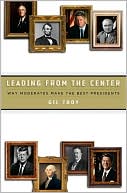The Moderometer: Charting Obama's Zig-Zag, September 28 to October 12
by Gil Troy, with Theodoric Meyer
Mr. Troy is Professor of History at McGill University in Montreal and a Visiting Scholar at the Bipartisan Policy Center in Washington, DC. His latest book is: Leading from the Center: Why Moderates Make the Best Presidents (Basic Books).
| | This is part of an ongoing project to track the ideological shifts of the Obama administration. Click here to read the initial installment. Key search phrase for other installments in this series:"The Moderometer" |
For better or for worse, the media has largely ignored President Obama’s legislative efforts during the past few weeks, preferring to focus on the president’s highly publicized trip to Copenhagen in support of Chicago's failed Olympic bid and his surprise Nobel Peace Prize win. Ultimately, as the furor over the Peace Prize reveals, Obama’s policy successes will shape his historic legacy much more than the sideshows of Olympic medals and Nobel Prizes.
.jpg)
October 10, 2009: PROMISES, ONCE AGAIN, TO END ‘DON’T ASK, DON’T TELL’: Speaking at a dinner held by the influential gay advocacy group Human Rights Campaign, President Obama echoed an earlier pledge to end the military’s “Don’t Ask, Don’t Tell” policy. He neglected, however, to set a timetable for doing so, frustrating much of the gay community. As commander-in-chief, President Obama could theoretically overturn the policy by issuing an executive order, as President Harry Truman did in 1948 to end segregation in the military. (Domestic – Left)
.jpg)
October 9, 2009: ACCEPTS NOBEL PEACE PRIZE: In an announcement that surprised the world, the Nobel committee announced that President Obama had won this year’s Nobel Peace Prize. The president accepted the award later that afternoon, saying that he was “deeply humbled” by the prize. Though not a policy move in itself, Obama’s acceptance of the peace prize demonstrated the extent to which he has broken with much of his predecessor’s foreign policy. (Foreign – Left)
.jpg)
October 6, 2009: SEARCHES FOR MIDDLE GROUND ON AFGHAN WAR: Though he remains undecided on whether or not he will send more troops to Afghanistan per General Stanley McChrystal recommendation, President Obama told senior senators and congressmen that he would not substantially draw down American forces in the country. Many Democrats in Congress have recently voiced opposition to a buildup, while Republicans such as Senator John McCain (R-AZ) have encouraged Obama to order the increase without delay. White House officials have indicated that the president is several weeks from a decision. (Foreign – Center)
.jpg)
September 30, 2009: WEAKENS ‘MEDIA SHIELD’ BILL: In move that reflects the administration’s conservative stance on national security matters, President Obama sent a bill designed to protect reporters back to Congress with significant revisions. The bill, sponsored by Senator Arlen Specter (D-PA) and Senator Chuck Schumer (D-NY), originally included provisions to protect reporters from being forced to testify information obtained from confidential sources. The Obama administration’s changes, however, render those protections largely ineffective when cases involve matters of national security. “The White House’s opposition to the fundamental essence of this bill is an unexpected and significant setback,” Schumer wrote in a response statement. (Domestic – Right)
.jpg)
September 30, 2009: AUTHORIZES E.P.A. TO MOVE FORWARD ON REGULATIONS: Faced with the increasingly low probability that Congress will pass a climate change bill before international talks in Copenhagen in December, President Obama authorized the Environmental Protection Agency to start preparing new emissions rules. Such regulations, which would chiefly affect the country’s 400 largest power plants, have been stridently opposed by both the industry and some elements of the G.O.P. Faced with the prospect of E.P.A. regulation, Senator John Kerry (D-MA) and Senator Lindsay Graham (R-SC) published a joint op-ed piece in
The New York Times in response urging bipartisan Congressional action. (Domestic – Left)
.jpg)
September 28, 2009: BACKTRACKS ON GUANTÁNAMO DEADLINE: In his daily briefing, Press Secretary Robert Gibbs implied that President Obama may not meet his self-imposed deadline for closing the detention facility at Guantánamo Bay. “We’re not focused on whether or not the deadline will or won’t be met on a particular day,” Gibbs told reporters. When he took office in January, the president promised to close the prison within a year. This has been made difficult, however, by the thorny legal questions surrounding the prisoners and Congressional opposition to having the men transferred onto U.S. soil. (Foreign – Right)

.jpg)
.jpg)
.jpg)
.jpg)